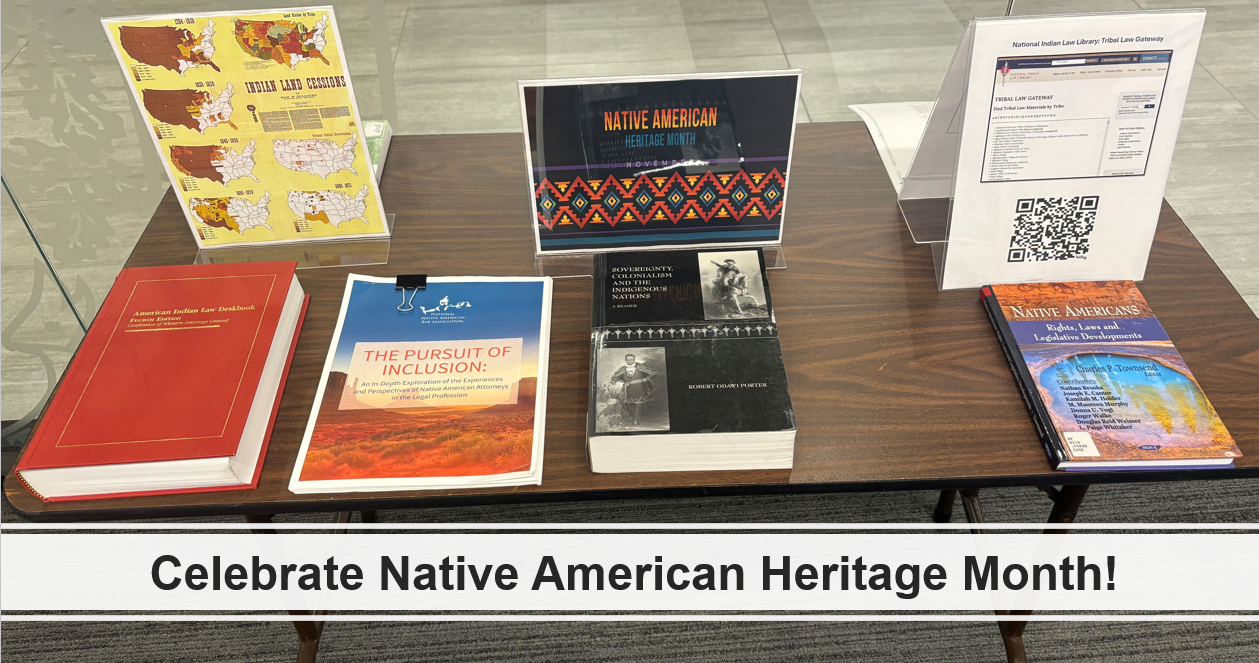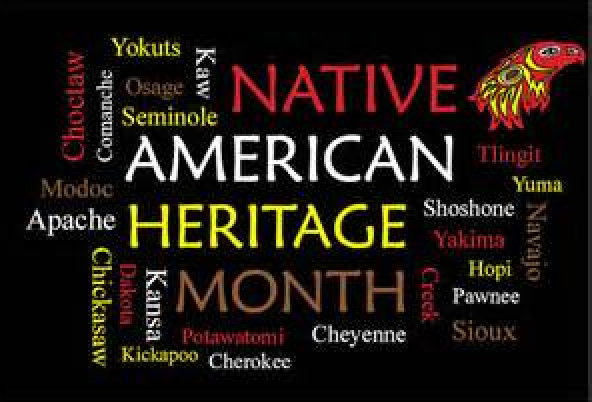This Week in the Law Library ... Nov. 25, 2024
This week in the Law Library we're teaching online searching and Advanced Legal Research, and celebrating Thanksgiving and Native American Heritage Month.
Law Library Hours
The Law Library will be closed Thursday, November 28 and Friday, November 29th for Thanksgiving. Law students, faculty, and staff will still have their 24/7 access to library study spaces and resources. Working from home? Don't forget our databases and study aids!
This Week’s Research Sessions
Monday, Nov. 25, 2024
LLM Research and Writing
- 9:00am - 10:35am
- Room 230
- Shannon Kemen, Legal Technology & Research Instructional Services Librarian
- Online Searching
Wednesday, Nov. 27, 2024
Advanced Legal Research Ohio Legal Research
- 2:00pm - 2:55pm
- Room 245
- Ronald Jones, Electronic Resources Instructional Services Librarian & Shannon Kemen, Legal Technology & Research Instructional Services Librarian
American Indian and Alaska Native Heritage Month
Image by: The Library of Congress from Defense Logistics Agency
November is American Indian and Alaska Native Heritage Month! Celebrate with us as we explore the contributions and history of the Native people in the United States of America.
History Behind the Month
As far back as the late 1970s, Congress enacted legislation, and subsequent presidents issued, annual proclamations designating a day, a week, or a month to celebrate and commemorate the Nation’s American Indian and Alaska Native heritage.
On Aug. 3, 1990, Congress finally passed Pub. L. 101-343 which designated the month of November 1990 as “National American Indian Heritage Month.” Then, in 1991, Congress passed Pub. L. 102-123 which “authorize[s] and request[s] the President to proclaim the month of November 1991, and the month of each November thereafter, as ‘American Indian Heritage Month.’” President George H.W. Bush issued Proclamation 6368 on October 30, 1991.
Featured Study Aids
CALI Lesson American Indian Treaties
Available via CALI, this lesson will teach you how to locate treaties between Indian tribes and the United States government. It will also show you how to determine whether a particular treaty provision is still in effect and how to interpret ambiguous treaty provisions. If using CALI, you will need to create an account (if you have not already done so) using a Cincinnati Law authorization code. You can obtain this code from a reference librarian.
Indian Law Stories
Available via West Academic study aid subscription, this book covers the often complex and unfamiliar doctrine of federal Indian law, exposing the raw conflicts over sovereignty and property that have shaped legal rulings. Fifteen distinguished authors describe gripping cases involving Indian nations over more than two centuries, each story emphasizing initiative in tribal communities and lawyering strategies that have determined the fate of nations.
Mastering American Indian Law
Available via the LexisNexis Digital Library study aid subscription, Mastering American Indian Law is a text designed to provide readers with an overview of the field. By framing the important eras of U.S. Indian policy in the Introductory Chapter, the text flows through historical up to contemporary developments in American Indian Law. This book will serve as a useful supplement to classroom instruction covering tribal law, federal Indian law and tribal-state relations.In ten Chapters, the book has full discussions of a wide range of topics, such as:Chapter 2 – American Indian Property Law;Chapter 3 – Criminal Jurisdiction in Indian Country;Chapter 4 – Tribal Government, Civil Jurisdiction and Regulation;Chapter 8 – Tribal-State Relations; andChapter 9 – Sacred Sites and Cultural Property Protection.Throughout the text, explanations of the relevant interaction between tribal governments, the federal government and state governments are included in the various subject areas. In Chapter 10 – International Indigenous Issues and Tribal Nations, the significant evolution of collective rights in international documents is focused upon as these documents may be relevant for tribal governments in relations with the United States.
Featured Database
Indigenous Histories and Cultures in North America
This database allows you to explore manuscripts, artwork and rare printed books dating from the earliest contact with European settlers right up to photographs and newspapers from the mid-twentieth century. Browse through a wide range of rare and original documents from treaties, speeches and diaries, to historic maps and travel journals.
Featured Guide
Native American Law Research
This guide, by the University of Oklahoma Law Library, focuses on a broad overview of resources available to researchers of Federal Indian, tribal, and indigenous peoples law issues. Tribal law is notably distinct from federal Indian law. Federal Indian law concerns the relationship between federal, state, and tribal governments, while tribal law is the law tribes develop and apply to their members and territories. Because many of the resources available to research Federal Indian law are similar to the resources used to research other areas of the law, less emphasis is placed on Federal Indian Law research. While some detail is provided, users of the guide should remember that this guide is introductory in nature
Featured Treatise
Cohen's Handbook of Federal Indian Law
Available on Lexis, Cohen’s Handbook of Federal Indian Law is an encyclopedic treatise written by experts in the field, and provides general overviews to relevant information as well as in-depth study of specific areas within this complex area of federal law. This is an updated and revised edition of what has been referred to as the ""bible"" of federal Indian law. This publication focuses on the relationship between tribes, the states and the federal government within the context of civil and criminal jurisdiction, as well as areas of resource management and government structure.
Featured Video
ABA Section of Civil Rights and Social Justice, Status, Realities, Legal Framework and Future of Indigenous Peoples in the US and Canada
In this webinar, panelists discuss the current status and resiliency of indigenous peoples in the United States and Canada. The panelists address the critical question of how past discriminatory – and even brutal governmental policies – led us to the current status of indigenous peoples today. More importantly, the panelists discuss what steps, laws, and policies can be taken to improve the lives of indigenous peoples in the United States. and Canada. The panelists compare and contrast the history, status, and future of the First Nations People in Canada vs. American Indians and Alaska Natives in the United States.
Featured Website
National Indian Law Library
The National Indian Law Library (NILL) of the Native American Rights Fund is a law library devoted to federal Indian and tribal law. NILL maintains a unique and valuable collection of Indian law resources and assists people with their Indian law-related research needs. Of particular note is their Tribal Law Gateway.

Want to learn more about Native Americans and the law? Check out our display in 110, the law library services suite.
5 Selected Resources to Learn More About American Indian and Alaska Native Heritage
Independent Voices: Native Americans
Independent Voices is an open access digital collection of alternative press newspapers, magazines and journals, drawn from the special collections of participating libraries. These periodicals were produced by feminists, dissident GIs, campus radicals, Native Americans, anti-war activists, Black Power advocates, Hispanics, LGBT activists, the extreme right-wing press and alternative literary magazines during the latter half of the 20th century.
Library of Congress, Indigenous Law Web Archive
The Law Library collects and preserves primary law sources of Indigenous nations, which are sovereign governments by treaty with the United States. At the time this collection started, there are 578 tribes and 92 agencies. This archive includes constitutions of a number of sovereign nations, including Navajo Nation, Muscogee Nation, Cherokee Nation, Comanche Nation, Hopi Tribe, etc. and ordinances, Supreme Court papers, court rules and forms for criminal, civil and family courts, and wellness courts. Tribal executive orders, emergency orders, ordinances and legislation are included in this collection as well. Tribes, nations, bands, communities and rancherias do communicate with their citizens by social media and at times when that was the sole source of legal documentation, we have targeted social media sites for capture where possible.
McKenney & Hall: History of the Indian Tribes of North America
McKenney & Hall: History of the Indian Tribes of North America is a collection of 125 images of lithographic and chromolithographic plates. Thomas Loraine McKenney (1785-1859) served as Commissioner of Indian Affairs from 1824 to 1830. In that capacity he commissioned and collected portraits of Native Americans for his Gallery in the War Department. McKenney's goal was to publish a record of vanishing peoples: portraits¸ biographical sketches and a history of North American Indians. He accomplished this in the first issue of History of the Indian Tribes of North America¸ published in three volumes between 1838 and 1844. James Hall (1793-1868) provided the text.
Native American Constitution and Law Digitization Project
The Project was created as a cooperative effort between the University of Oklahoma College of Law Library and the National Indian Law Library (NILL), to provide access to the tribal constitutions, codes, and other legal documents. Project Coordinators were David Selden (NILL) and Marilyn Nicely (OU).
The Project began in 1996. The developing technology of the World Wide Web offered a new opportunity to share information. The University of Oklahoma College of Law Library partnered with the National Indian Law Library to acquire and digitize these materials at a time when tribal documents were very difficult to find. The Project was created as a public service. Tribal documents were shared with permission from the National Indian Law Library or donated directly by tribal members. Other materials included are federal government documents in the public domain or publications shared with the permission of their creators.
Tribal Court Clearinghouse
The Tribal Law & Policy Institute is a Native American operated non-profit dedicated to providing free publication resources, comprehensive training, and technical assistance for Native nations and tribal justice systems. This website contains compilations and links to tribal court decisions, resources and links to tribal laws/codes and constitutions.
Posted Nov. 25, 2024 by Susan Boland
